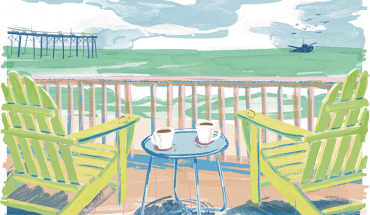Humorist Celia Rivenbark notes how our electronics just may be our saviors in the midst of the pandemic.
by Celia Rivenbark | illustrations by Jillian Ohl
My grandmother was the queen of idioms, particularly when she was trying to keep my sister and me occupied on steaming summer afternoons in rural Duplin County.
“Idle hands are the devil’s workshop,” she’d say with a wink. She wasn’t a holy roller, she just liked saying it. She’d read us poetry or teach our little fingers to play on a piano she kept tuned by a fella who drove all the way over from Clinton. Or she’d coach us on the Catechism or challenge us to a card game called “Authors.” For very young country kids, we knew a ridiculous amount of fun facts about Alfred “Lloyd” Tennyson, as I thought he was called.
“Man is known by the company he keeps,” she’d say. This one had a bit more tooth in it—and I had the feeling she was thinking of her older sister’s poor choice in a spouse. When speaking of him, she was fond of saying, “she strolled through the garden of love and picked a lemon!”
But her favorite idiom was often used to “rescue” us from the abysmal choice of squeezing into her recliner to watch a completely inappropriate Search For Tomorrow or The Edge of Night on a black and white console TV big enough to double as a buffet in a pinch: “Oh, no! See what happens when I leave you to your own devices!”
That expression is literal these days, isn’t it? We’re all left to our own devices, although from where I sit, we’re not so much “left” as “restored by,” “salvaged by,” “sustained by” and—yes—“saved by” our devices. Amen.
Without “our devices,” I would never have experienced the hilarity that ensues when friends decided to learn how to Zoom and Google Hangout and Houseparty just so we could play a game I invented: Drunken Hangman.
No applause, please.
COVID-19 has left us all to our own devices. And that, my friends, is why I spent a recent Saturday night with my husband and friends taking turns playing a Tiger King-themed game of hangman via Google Hangout. And, yes, there was drinking involved, because it adds a bit of excitement to the exaggerated and highly dramatic addition of head, torso, arms, legs and (although I was opposed to it) fingers and toes. If you must know, my team lost. Naturally, I blame Carole Baskin.
Left to our own devices means FaceTiming for 20 minutes with the freakishly elongated chin of an elderly relative. It’s not that her chin is exceedingly large or jutting; it’s that it’s hard to hold the phone just right sometimes. After a few earnest attempts to gently ask her to “change the angle,” I made my peace with talking to her chin and it was all just fine.
Zoom is my preferred method of communication with the gaggle of women friends I’ve loved for decades now. Together, we all raised our babies into sometimes sulky teens and now working professionals scattered into the real world like so much birdshot.
With Zoom, I can see my girlfriends’ smiling faces—wearing makeup, just like me, because it makes things feel almost normal—on one screen divided into nine perfect blocks. It’s like the opening credits of The Brady Bunch, if little Cindy and Bobby were holding oversized goblets of pinot grigio, that is. It’s wine time with these women, and we look forward to it every week. Our sacred catch-up—that was usually shared in a local restaurant—can now be observed on a porch, a kitchen counter, or even (when I threw my back out) from the cold hardwood of my bedroom floor. (“Why the hell are you sideways?”)
Left to my own devices means I grudgingly bequeathed my Kindle to Darling Daughter because, well, I have two and I’m not a complete jerk. I don’t think.
Left to our own devices means different things for my daughter and husband. She spent mornings remote-teaching her kindergarten class back in Charlotte, using two laptops and a phone. She uploaded videos of herself reading popular children’s books on YouTube for the class and I pretended to not listen… but, honestly, it made my heart sing hearing her read How Do Plants Help Us? with a happy little lilt I imagine little kids would find quite comforting. I know I do.
Left to his own devices means my husband is always on his phone or his laptop because his job at New Hanover Regional Medical Center has morphed into coordinating aid (everything from protective equipment to a home-cooked meal) for employees and finding beds for homeless folk who test positive. He wakes up at night in a sweat, not from fever, but from fear of what’s to come for patients and staff. For what’s to come for any of us.
Being left to our own devices isn’t a bad thing these days. It’s saving our sanity and enabling us to stay in touch, laugh a little and actually get some work done. Grandmother couldn’t have imagined these “devices,” but I have a feeling she would’ve embraced them—at least long enough to check in on me and my sister while we gazed, amused, at just her earlobe.




